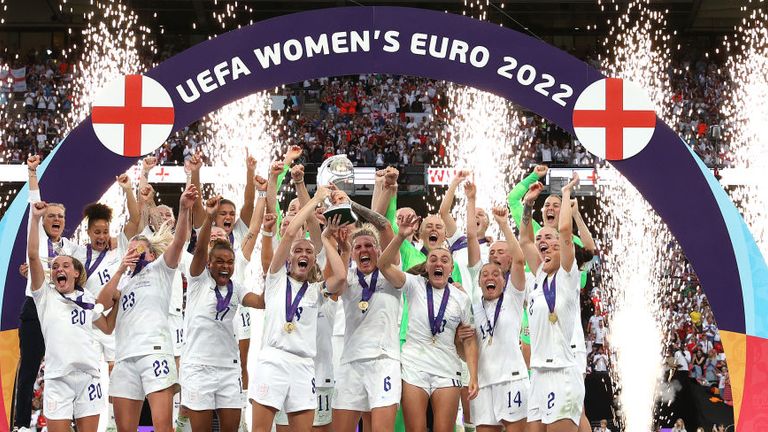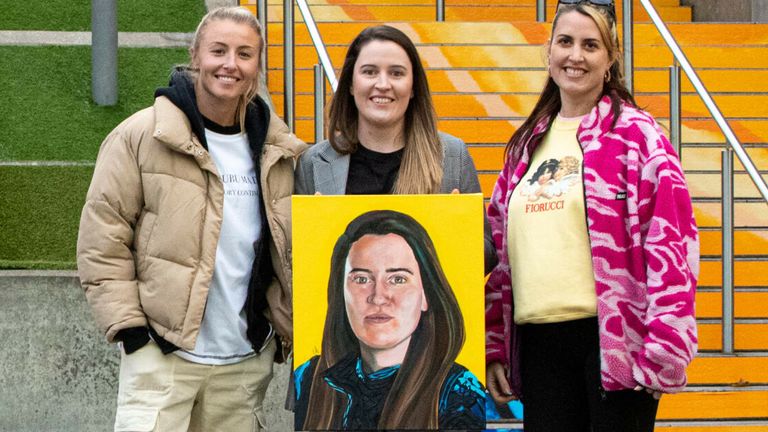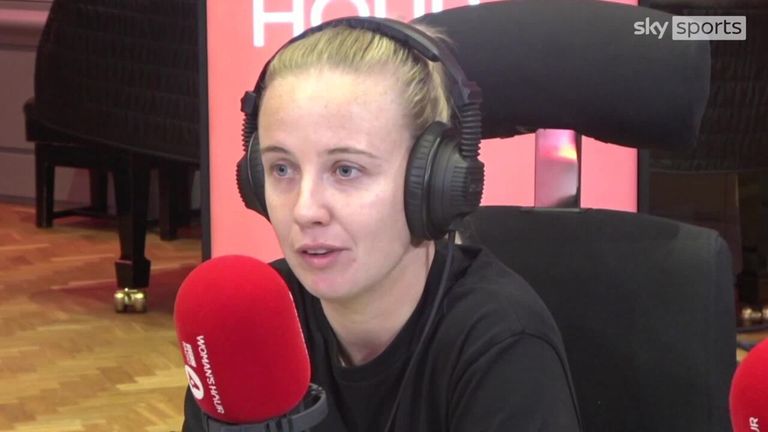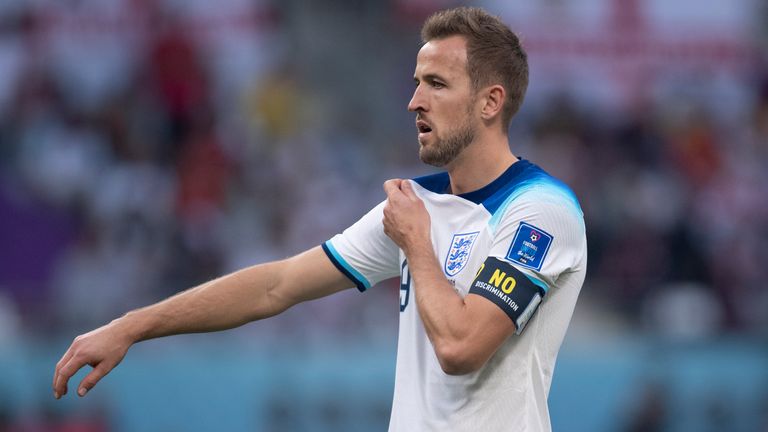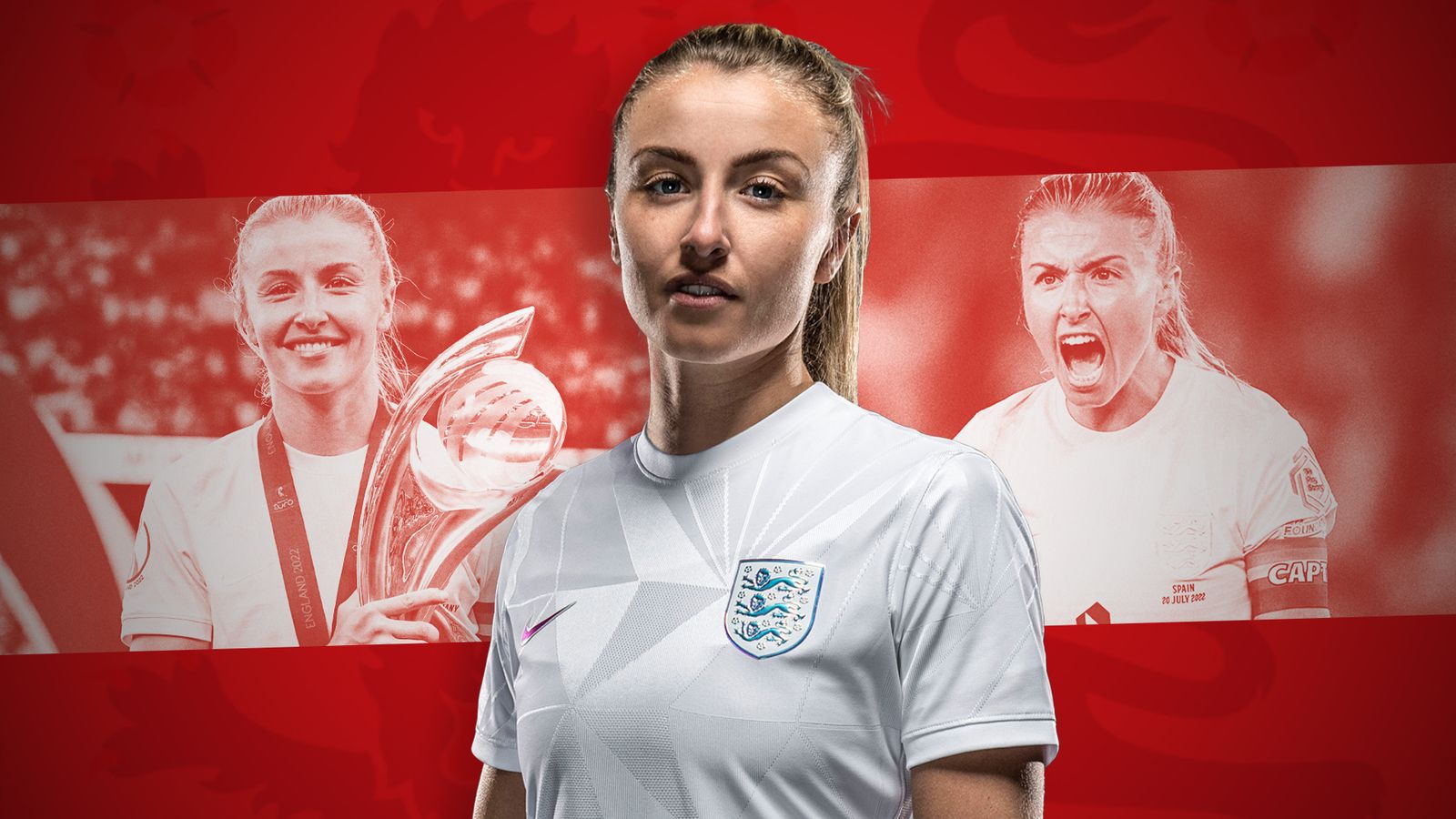
Football supporters may go to Wembley expecting to see their heroes, but it’s rare they get to meet them on the street as they walk past the national stadium.
But that chance was afforded to a lucky few when they bumped into Leah Williamson on a rainy November day, with the England women’s captain back at the scene of her and her team-mates’ greatest triumph.
It’s often said the women’s Euros, held in England this summer, was the breakthrough moment for women’s football in this country thanks to the host nation lifting the trophy for the first time.
The fact that Williamson’s club, Arsenal, have twice sold more than 40,000 tickets for Women’s Super League matches at the Emirates this season demonstrates the way in which women’s football has gripped the nation’s attention.
But another perfect example was the amount of people taking time out of their day to queue for a picture with Williamson outside Wembley, many of them after doing a double-take as they walked by and clearly asking themselves, ‘Is that really the England captain standing there?’
Williamson is happy to pose for as many pictures as possible before, in an attempt to avoid a sudden downpour that scatters the crowds, moving to a nearby pub for an exclusive chat with Sky Sports.
The setting – just a few hundred metres from the stadium where she became the first England football captain to lift a major trophy in 56 years – is fitting.
“I think this is the only other way I’d have liked to have done that game – in a pub, watching it with my mates!” jokes Williamson. “It’s always good to come back. I think I’ll always associate it now with that night.”
England’s extra-time victory over Germany may be four months ago but clearly remains a huge source of pride for Williamson.
“Honestly, to stand alongside those girls… when tournaments come around, the reason you want to be involved is because you know how great the tournament’s going to be,” she said.
“It’s obviously a great moment as a professional footballer performance-wise but the time that you have, the memories that you make and then hopefully the change that you can make, is incredible.
“Obviously, by winning, we made the biggest impact we possibly could have. I’m so proud to have been a part of that.”
The Euros final not only secured Williamson’s place in the country’s football history but also ensured she is in high demand, with appearing on the cover of GQ and creating playlists on Radio 1 among her recent activities away from the pitch.
Williamson agrees that life has got busier since the summer but insists: “I’ve also turned down quite a lot as well – I am a footballer! I’m glad that’s still the thing I love doing the most.
“I love football because it’s introduced me to people, different opinions, different cultures, different ways of life and different industries that really interest me.
“Every time I step out on a platform I represent women’s football, which is what we want to happen.”
The current platform – the one that has brought her back to Wembley – sees her unveiling a mural of Helen Hardy, the founder of Manchester Laces, the first inclusive women’s and non-binary football club in Manchester.
The piece was created by artist Charlotte Archer, in conjunction with the National Lottery, to celebrate those supporting women in sport and encourage other to get involved.
The cause is at the “top of our agenda” says Williamson, adding: “I benefited from the National Lottery and I stand on the top platform in women’s football in this country, but that funding goes to causes where, if I hadn’t got to where I am, I’d hope would be a place for me to enjoy football.
“That’s what this campaign is celebrating, which is really important to me.”
Williamson’s support and empowerment of women in sport, as well as the use of her platform to speak out on issues that matter to her, has been enhanced since she was permanently named England captain by manager Sarina Wiegman in April, but she says it’s something she would be doing regardless of whether she was in possession of the armband.
“If you’re a women’s footballer you know you have that responsibility – it’s a given,” she says. “It’s almost like it’s passed onto you from the person ahead of you so we’re all pretty well-versed on it and it’s something that actually matters to us. I hope this continues.
“The world’s obviously changing now but, when we were younger, we didn’t have what young girls have now and we hope young girls in the future have more.
“Obviously, being captain, I’ll be on certain platforms and have a chance to speak – and it’s important I use my voice – but everyone carries that same weight on their shoulders. But we love it – it’s part of the job.”
One of the issues Williamson has tackled in recent weeks is the men’s World Cup in Qatar, a country that has faced numerous questions regarding its treatment of the LGBTQ+ community, as well as migrant workers.
While expressing her support for the England men’s side, the 25-year-old has admitted the choice of host nation is making following the tournament as a supporter a less enjoyable experience.
Williamson says she has been following the tournament – “I love football and I want to watch football” – but adds: “I just wish we were heading into a World Cup where we can enjoy it for what it is.
“Unfortunately, the shadow that hangs over the tournament just makes that a little bit harder,” Williamson adds. “It doesn’t feel like a normal World Cup for me.
“But I love football and I want the boys to win the World Cup. I want to be there to celebrate with them – I just wish all we were talking about was football because that’s what we normally do.”
As well as events on the pitch in Qatar, the U-turn performed by the Football Association – plus several other European federations – over plans for captain Harry Kane to wear the OneLove armband have dominated the headlines.
The armband – designed to show support for the LGBTQ+ community – was due to be worn by Kane and his fellow captains during the World Cup but those plans were ditched under the threat of punishment by FIFA.
While the FA has been criticised for backing down, others – including former England international Alex Scott and Nancy Faeser, a senior German politician – have displayed the OneLove armband in Qatar.
“I’m proud that people have worn it,” says Williamson. “I’m proud with my friend Alex for wearing it on national television.
“I’m glad people are wearing it and still getting those messages across, because we’ve always used football as a vehicle for promoting those positive messages.”
One positive message Williamson and her England team-mates received before the Euros came from the men’s team, who shared their experiences of reaching the final of the men’s competition – where they were beaten by Italy on penalties at Wembley – the previous year.
But having gone one better than their male counterparts in the summer, Williamson says the women’s team didn’t have the chance to reverse the roles before Gareth Southgate’s squad headed to Qatar.
“I’ve only had individual discussions with the boys because of their schedule and going straight off the club season,” explained Williamson.
“Before the Euros, it was perfect for us because they were around the camp and we could really integrate. Maybe that would have been beneficial.
“But I’m certainly not going to stand in front of anybody and tell them how to do it, even though I’ve done it once. That doesn’t make me any different to before.”
Whether Kane is able to join Williamson in leading England to glory on the international stage this winter remains to be seen.
As for Williamson, she reveals the focus of Wiegman’s squad moved onto their own World Cup – taking place in Australia and New Zealand next summer – a long time ago.
“As soon as we won the Euros it was like, ‘What’s next?'” reveals Williamson. “You’re almost chasing that high again.”
So can we expect to see her hoisting another trophy aloft, becoming the first England football captain to lead their team to two major international titles?
“It was the same before we went into the Euros,” says Williamson. “Who knows?”

